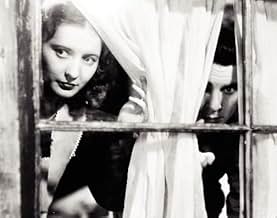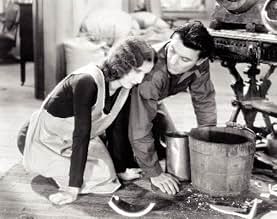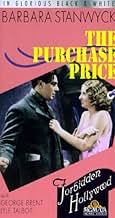IMDb-BEWERTUNG
6,4/10
2038
IHRE BEWERTUNG
Füge eine Handlung in deiner Sprache hinzuA torch singer becomes a farmer's mail-order bride.A torch singer becomes a farmer's mail-order bride.A torch singer becomes a farmer's mail-order bride.
- Regie
- Drehbuch
- Hauptbesetzung
Mae Busch
- Queenie - Girl on Train
- (Nicht genannt)
Nick Copeland
- Skins' Pal at Shivaree
- (Nicht genannt)
Mike Donlin
- Tom Buchanan - Man at Shivaree
- (Nicht genannt)
Harrison Greene
- Man in Hotel Lobby
- (Nicht genannt)
Crauford Kent
- A.C. Peters - The Banker
- (Nicht genannt)
Matt McHugh
- Waco - Fields' Henchman
- (Nicht genannt)
John 'Skins' Miller
- Skins - The Accordion Player
- (Nicht genannt)
Carlyle Moore Jr.
- Hotel Desk Clerk
- (Nicht genannt)
Edmund Mortimer
- Dance Extra
- (Nicht genannt)
William H. O'Brien
- Waiter in Opening Nightclub Scene
- (Nicht genannt)
Henry Otho
- Extra in Beer Hall and at Shivaree
- (Nicht genannt)
Empfohlene Bewertungen
Sometimes I think you just have to be in the mood for certain films. This may have been one of those times. "The Purchase Price" from 1932, largely thanks to Barbara Stanwyck, is actually a very sweet film.
Stanwyck plays Joan, a torch singer, unhappy with her present life and the racketeer, Eddie Fields (Lyle Talbot) with whom she's involved. When she finds out that someone has used her photo and sent it off to be a mail-order bride, Joan decides to show up in person and takes off.
She ends up in farm country with Jim Gilson (George Brent) who's in debt up to his eyebrows. However, over the years, he has developed an excellent grain seed - if he can stave off the creditors until the next planting season, he'll be okay.
To Joan's credit, she settles in, determined to make him a good wife and to be a good neighbor, and she falls in love with Jim. When her ex-beau shows up, Jim jumps to some wrong conclusions.
Barbara Stanwyck is great in this, giving a warm, sincere performance. She is glamorous in the first few scenes (though boy, she can't sing), and she remains sexy and pretty even plainly dressed on the farm, causing a lot of men to notice her and make dumb old Jim jealous.
This is a different kind of role for George Brent, who soon would be well-dressed, mustached, and sophisticated as he played opposite Bette Davis. Here he's an oaf.
The movie is short and moves quickly. Stanwyck's performance helps give a freshness to a story that was old even back in 1932.
Stanwyck plays Joan, a torch singer, unhappy with her present life and the racketeer, Eddie Fields (Lyle Talbot) with whom she's involved. When she finds out that someone has used her photo and sent it off to be a mail-order bride, Joan decides to show up in person and takes off.
She ends up in farm country with Jim Gilson (George Brent) who's in debt up to his eyebrows. However, over the years, he has developed an excellent grain seed - if he can stave off the creditors until the next planting season, he'll be okay.
To Joan's credit, she settles in, determined to make him a good wife and to be a good neighbor, and she falls in love with Jim. When her ex-beau shows up, Jim jumps to some wrong conclusions.
Barbara Stanwyck is great in this, giving a warm, sincere performance. She is glamorous in the first few scenes (though boy, she can't sing), and she remains sexy and pretty even plainly dressed on the farm, causing a lot of men to notice her and make dumb old Jim jealous.
This is a different kind of role for George Brent, who soon would be well-dressed, mustached, and sophisticated as he played opposite Bette Davis. Here he's an oaf.
The movie is short and moves quickly. Stanwyck's performance helps give a freshness to a story that was old even back in 1932.
The appeal of this somewhat run-of-the-mill film is Barbara Stanwyck in an early display of her mega-watt star power and her ability to turn mediocre material into something special.
Her character doesn't make much sense: a nightclub singer from the city who wants to get away from the bootlegger boyfriend hounding her and so agrees to an arranged marriage with a farmer up in the wilds of North Dakota! The bootlegger (played by Lyle Talbot) isn't threatening or abusive, so one wonders why Stanwyck needs to go to such great lengths to avoid him -- keep wondering, because the movie never explains it. But if you can swallow that, then you can easily swallow the fact that this urban good-time gal seems to know all about how to run a farm.
Which brings me back to Stanwyck. The movie's premise isn't remotely plausible, but Stanwyck somehow makes it so through the confidence of her performance. I really think she could make anything worth sitting through just for the pleasure of watching her.
The film does provide an interesting look at what farm life in the early days of the 1930s was like, a lifestyle I've only seen recreated in more modern-day movies.
Grade: B-
Her character doesn't make much sense: a nightclub singer from the city who wants to get away from the bootlegger boyfriend hounding her and so agrees to an arranged marriage with a farmer up in the wilds of North Dakota! The bootlegger (played by Lyle Talbot) isn't threatening or abusive, so one wonders why Stanwyck needs to go to such great lengths to avoid him -- keep wondering, because the movie never explains it. But if you can swallow that, then you can easily swallow the fact that this urban good-time gal seems to know all about how to run a farm.
Which brings me back to Stanwyck. The movie's premise isn't remotely plausible, but Stanwyck somehow makes it so through the confidence of her performance. I really think she could make anything worth sitting through just for the pleasure of watching her.
The film does provide an interesting look at what farm life in the early days of the 1930s was like, a lifestyle I've only seen recreated in more modern-day movies.
Grade: B-
BARBARA STANWYCK is a city gal fed up with the sophisticated life of a nightclub singer and her lecherous boyfriend (LYLE TALBOT) and who sees an "escape" by fleeing to the country for a more bucolic existence and more wholesome environment. She gets more than she bargains for when her mail order husband turns out to be shy farmer (GEORGE BRENT), whom she at first repulses when he comes on too strong with his lovemaking and then spends the rest of the film trying to make it up to him.
The unusual domestic drama gives both Stanwyck and Brent offbeat roles which they handle beautifully. Brent is a surprising revelation as the shy, bumbling country guy with no understanding of Stanwyck's softer feelings and holding off loving her until the final reel, after the two of them have to save their crop of wheat from burning to the ground.
Only weak point in the story is the overdone nature of the wild party scene shortly after their wedding and Stanwyck's reaction to the crudeness of the country bumpkins. It seems a bit of a stretch to believe the way this scene unfolds.
But otherwise, an interesting look at Stanwyck who excels in showing both sides of her character--tough and tender--and Brent, who is usually the more debonair, sophisticated man showing us another side of his personality (and with some nice touches of humor too) as the shy groom. They both get excellent support from LYLE TALBOT as "the other man" in a rather thankless role that he makes believable.
Well worth watching and nicely directed by William Wellman.
The unusual domestic drama gives both Stanwyck and Brent offbeat roles which they handle beautifully. Brent is a surprising revelation as the shy, bumbling country guy with no understanding of Stanwyck's softer feelings and holding off loving her until the final reel, after the two of them have to save their crop of wheat from burning to the ground.
Only weak point in the story is the overdone nature of the wild party scene shortly after their wedding and Stanwyck's reaction to the crudeness of the country bumpkins. It seems a bit of a stretch to believe the way this scene unfolds.
But otherwise, an interesting look at Stanwyck who excels in showing both sides of her character--tough and tender--and Brent, who is usually the more debonair, sophisticated man showing us another side of his personality (and with some nice touches of humor too) as the shy groom. They both get excellent support from LYLE TALBOT as "the other man" in a rather thankless role that he makes believable.
Well worth watching and nicely directed by William Wellman.
This is sold as "pre-Code," as if there will something risqué or shocking, but certainly by today's standards -- or lack thereof -- and even by those of the era, there is nothing to bother your grandma or even your (reasonable) preacher.
There is something, though, to excite the movie-lover: Barbara Stanwyck's performance.
Apparently in real life she was a pretty tough cookie, and certainly she played some hard women in many of her films.
In "The Purchase Price" her character refers to herself as having maintained some sort of a reputation and in fact she comes across as a very nice, even admirable person.
She certainly looked good, with a gentle strength, or strong gentleness, poking out of the chorus girl/mistress persona.
The story, though, never does make much sense, and why the people did what they did, except for the character played by Lyle Talbot -- in a great role for him, and excellently played -- is not clear.
One more glaring error: North (brrrr) Dakota doesn't have any hills, and the shots of snow-capped peaks showed that wherever this film was shot, it sure wasn't North (brrrr) Dakota, you betcha.
One scene of plowing showed the genuine agoraphobic look of that state, where neither hills nor even trees are native. Except for cottonwoods along the creeks and rivers, what trees there are in North (brrrr) Dakota have had to be brought in from the real world.
Plus North (brrrrr) Dakota drunks and brawlers are not Irish and Scots, as this movie implies, but Poles and Czechs and Germans, sometimes even Norwegians, unless they are Lutherans then, of course, they don't drink or brawl. And if you don't believe me, ask their preachers.
Anyway, watch this for Stanwyck and suspend your disbelief about all the rest. She is worth spending your time.
There is something, though, to excite the movie-lover: Barbara Stanwyck's performance.
Apparently in real life she was a pretty tough cookie, and certainly she played some hard women in many of her films.
In "The Purchase Price" her character refers to herself as having maintained some sort of a reputation and in fact she comes across as a very nice, even admirable person.
She certainly looked good, with a gentle strength, or strong gentleness, poking out of the chorus girl/mistress persona.
The story, though, never does make much sense, and why the people did what they did, except for the character played by Lyle Talbot -- in a great role for him, and excellently played -- is not clear.
One more glaring error: North (brrrr) Dakota doesn't have any hills, and the shots of snow-capped peaks showed that wherever this film was shot, it sure wasn't North (brrrr) Dakota, you betcha.
One scene of plowing showed the genuine agoraphobic look of that state, where neither hills nor even trees are native. Except for cottonwoods along the creeks and rivers, what trees there are in North (brrrr) Dakota have had to be brought in from the real world.
Plus North (brrrrr) Dakota drunks and brawlers are not Irish and Scots, as this movie implies, but Poles and Czechs and Germans, sometimes even Norwegians, unless they are Lutherans then, of course, they don't drink or brawl. And if you don't believe me, ask their preachers.
Anyway, watch this for Stanwyck and suspend your disbelief about all the rest. She is worth spending your time.
This peculiar but interesting drama has Barbara Stanwyck as a weary nightclub torch singer with a "who cares?" attitude. To escape her underworld boyfriend, she decides to hide out in the bleak plains of North Dakota as a mail-order bride. As her shy farmer husband, the normally debonair George Brent is almost unrecognizable in a pair of overalls, but gives a sensitive characterization. The bulk of the plot follows the growing feeling between the reserved country mouse' and the tough city mouse', complicated by several villains. Tough guy director William Wellman keeps things moving at a clip, and uses his low budget wisely to stage several good set-pieces, including a drunken shivaree for the happy couple. In the supporting cast, Leila Bennett stands out as a plain-talking maid.
Wusstest du schon
- WissenswertesDuring the wheat-burning scene a stand-in was used instead of Barbara Stanwyck, but she didn't think the stand-in acted as the character so Stanwyck decided to play it herself. This resulted in her getting some burns on her legs, but she never complained.
- PatzerWhen Barbara Stanwyck gets off the train in North Dakota the terrain is very mountainous. North Dakota is on the Great Plains - very flat.
- Zitate
Eddie 'Ed' Fields: Ya daffy little tahmata, I'm bugs about ya. I'd marry ya myself, if I wasn't already married.
- VerbindungenFeatured in Barbara Stanwyck: Fire and Desire (1991)
- SoundtracksTake Me Away
(1932) (uncredited)
Music by Peter Tinturin
Lyrics by Sidney Clare and Charles Tobias
Played during the opening credits and at the end
Sung by Barbara Stanwyck at the nightclub
Played as background music often
Top-Auswahl
Melde dich zum Bewerten an und greife auf die Watchlist für personalisierte Empfehlungen zu.
- How long is The Purchase Price?Powered by Alexa
Details
- Erscheinungsdatum
- Herkunftsland
- Sprache
- Auch bekannt als
- The Purchase Price
- Drehorte
- Produktionsfirma
- Weitere beteiligte Unternehmen bei IMDbPro anzeigen
Box Office
- Budget
- 202.000 $ (geschätzt)
- Laufzeit
- 1 Std. 8 Min.(68 min)
- Farbe
- Sound-Mix
- Seitenverhältnis
- 1.37 : 1
Zu dieser Seite beitragen
Bearbeitung vorschlagen oder fehlenden Inhalt hinzufügen























